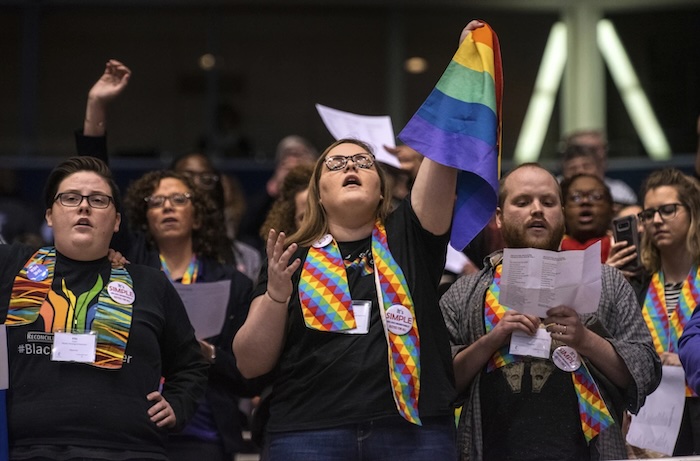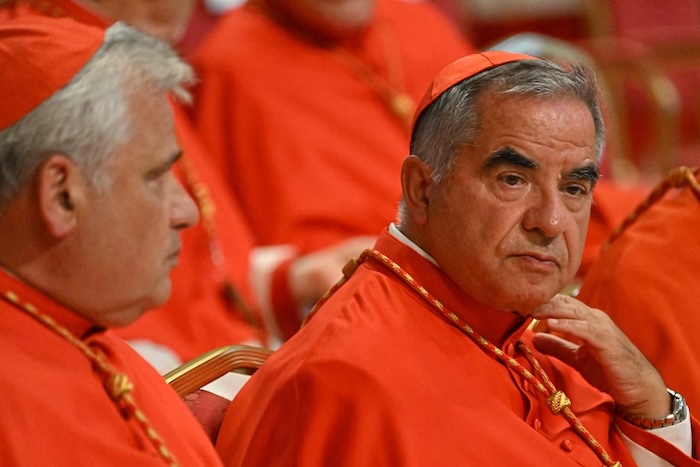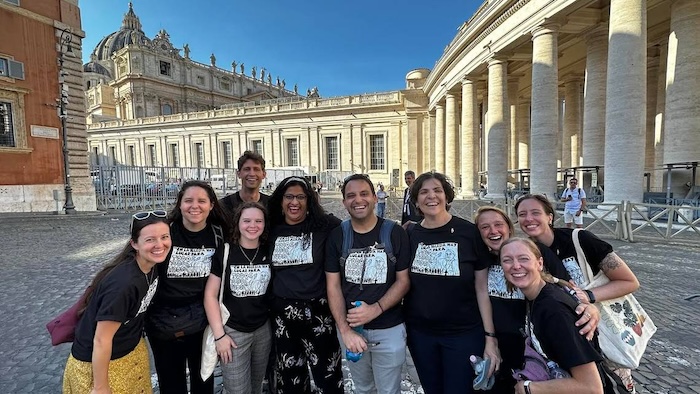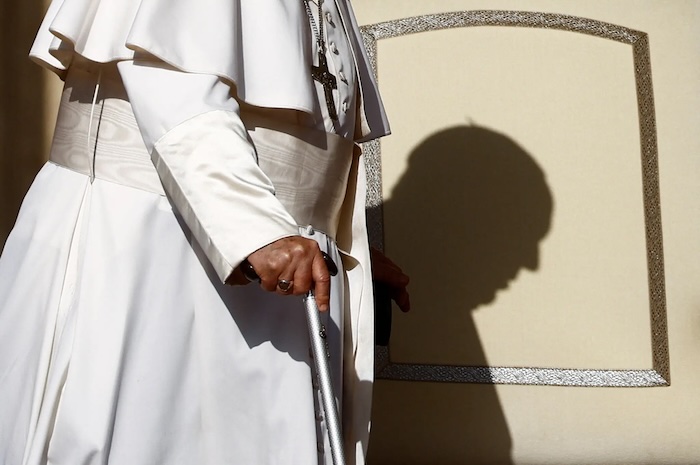— It’s a question fracturing major Christian denominations

FILE – Shelby Ruch-Teegarden, of Garrett-Evangelical Theological Seminary, joins other protestors during the United Methodist Church’s special session of the general conference in St. Louis, Tuesday, Feb. 26, 2019. United Methodist rules forbid same-sex marriage rites and the ordination of “self-avowed practicing homosexuals,” but progressive Methodist churches in the U.S. have increasingly been defying these rules.
By DAVID CRARY
Catholics around the world are sharply divided by the Vatican’s recent declaration giving priests more leeway to bless same-sex couples. Supporters of LGBTQ inclusion welcome the move; some conservative bishops assail the new policy as a betrayal of the church’s condemnation of sexual relations between gay or lesbian partners.
Strikingly, the flare-up of debate in Catholic ranks coincides with developments in two other international Christian denominations — the global Anglican Communion and the United Methodist Church — that are fracturing over differences in LGBTQ-related policies.
Taken together, it’s a dramatic illustration of how – in a religion that stresses God’s love for humanity – divisions over marriage, sexuality, and inclusion of gays and lesbians are proving insurmountable for the foreseeable future in many sectors of Christianity.
Ryan Burge, a political science professor at Eastern Illinois University and pastor of an American Baptist church, says it’s become increasingly difficult for Christian denominations to fully accommodate clergy and congregations with opposing views on same-sex relationships, particularly as such marriages have become legal in much of Europe and the Western Hemisphere.
“A lot of denominations are in the position where you have to make a decision — you can’t be wishy-washy anymore,” said Burge, a specialist in religious demographics. “That’s the tension they’re facing: how to keep older conservatives in the fold while attracting younger people.”
For global denominations — notably Catholics, Anglicans and United Methodists — Burge sees another source of tension: Some of their biggest growth in recent decades has been in socially conservative African countries where same-sex relationships are taboo.
“African bishops have this ammunition,” Burge said. “They say to the West, ‘We’re the ones growing. You have the money, we have the numbers.’”
Kim Haines-Eitzen, a professor of religious studies at Cornell University, said Christianity — throughout its history — has been divided over differing theological views, such as whether women could be ordained as clergy.
“Christianity is incredibly diverse — globally, theologically, linguistically, culturally,” she said. “There are bound to be these incredibly divisive issues, especially when bound up in scriptural interpretation. That’s what keeps world religions alive — that kind of push and pull.”
ANGST AMONG ANGLICANS
Among Christian denominations, the Anglican Communion is second only to the Catholic Church in geographic spread. Divisions over marriage, sexuality and LGBTQ inclusion have roiled the communion for many years, and they widened Dec. 17, when Church of England priests offered officially sanctioned blessings of same-sex partnerships for the first time.
The Church of England’s ban on church weddings for gay couples remains, but the decision to allow blessings has infuriated several conservative Anglican bishops from Africa, Asia, Latin America and the Pacific.
Caught in the middle is the archbishop of Canterbury, Justin Welby — the top bishop of the Church of England and ceremonial leader of the Anglican Communion.
Welby says he won’t personally bless same-sex couples because it’s his job to unify the world’s 85 million Anglicans. That hasn’t appeased some conservative bishops, who say they no longer recognize Welby as their leader.
The decision to allow blessings of same-sex couples followed five years of discussions about church positions on sexuality. Church leaders apologized for a failure to welcome LGBTQ people but also affirmed the doctrine that marriage is the union of one man and one woman.
“What we have proposed as a way forward does not go nearly far enough for many, but too far for others,” said Sarah Mullally, bishop of London.
UNITED METHODIST SEPARATION
A slow-motion breakup is underway in the United Methodist Church. A few years ago, it was the third-largest denomination in the United States, but a quarter of U.S. congregations have recently received permission to leave over disputes involving LGBTQ-related policies.
Of the more than 7,650 departing churches, most are conservative-leaning congregations responding to what they see as a failure to enforce bans on same-sex marriage and the ordaining of openly LGBTQ people.
There’s no firm estimate of how many members are leaving, as some who belong to departing congregations are joining other UMC churches. But UMC officials are preparing to cut denominational agencies’ budgets in anticipation of lower revenues from church offerings.
United Methodist rules forbid same-sex marriage rites and the ordination of “self-avowed practicing homosexuals,” but progressive Methodist churches in the U.S. have increasingly defied these rules.
Conservatives have mobilized like-minded congregations to exit; many are joining the new Global Methodist Church, which intends to enforce such rules.
More than half of United Methodist members are overseas, many in conservative African churches. When UMC delegates meet this spring, they’re expected to debate proposals to liberalize ordination and marriage policies, and make it easier for overseas churches to leave.
SPLITS IN OTHER PROTESTANT DENOMINATIONS
Presaging the UMC schism, several other mainline Protestant denominations over the past two decades endured splits resulting from irreconcilable differences between supporters and opponents of LGBTQ inclusion. For example, after the Episcopal Church ordained an openly gay bishop in 2003, some dioceses and conservatives formed the Anglican Church in North America.
Similar liberal/conservative differences prompted hundreds of congregations to leave the Evangelical Lutheran Church in America and the Presbyterian Church (U.S.A.) after they embraced LGBTQ-inclusive policies.
Some conservative denominations — such as the Southern Baptist Convention and The Church of Jesus Christ of Latter-day Saints — have adhered firmly to policies that reject recognition of same-sex relationships and ordination of openly LGBTQ people. These policies have prompted departures, but no major schism.
Brent Leatherwood, president of the Southern Baptists’ public policy commission, reiterated the SBC’s position in a statement asserting that the Vatican — under Pope Francis — “has been on a trajectory that seems destined for the allowance of same-sex marriage.”
“The reality is marriage has been defined by God … It is a union between one man and one woman for life,” Leatherwood said. “Southern Baptists remain anchored in this truth.”
ORTHODOX CHURCH DISAPPROVAL
The world’s second-largest Christian communion, after the Catholic Church, is the Eastern Orthodox Church, with an estimated 220 million members, concentrated mostly in Eastern Europe and Western Asia. To a large extent, Orthodox Christians disapprove of same-sex marriage and relationships.
In Greece, where the government is pledging to legalize same-sex marriage, the Orthodox Church has expressed strong opposition.
Russia’s Orthodox Church has supported tough anti-LGBTQ legislation enacted with the support of President Vladimir Putin.
NON-CHRISTIAN FAITHS
Debate over LGBTQ inclusion hasn’t been as divisive in the world’s other major religions as in Christianity.
In the Muslim world, there’s widespread disapproval of same-sex relationships and same-sex marriage; many Muslim nations criminalize homosexuality. However, some LGBTQ-inclusive mosques have surfaced in North America and other places.
Among Jews around the world, there are varying approaches to LGBTQ issues, but relatively little high-profile rancor. Orthodox Judaism disapproves of same-sex marriage and sexual relations, while they’re widely accepted in the Reform and Conservative branches.
In Hinduism and Buddhism, there is no universal, official position on same-sex marriage. Many practitioners of the two faiths disapprove of such unions; some communities are more accepting.
Complete Article ↪HERE↩!









